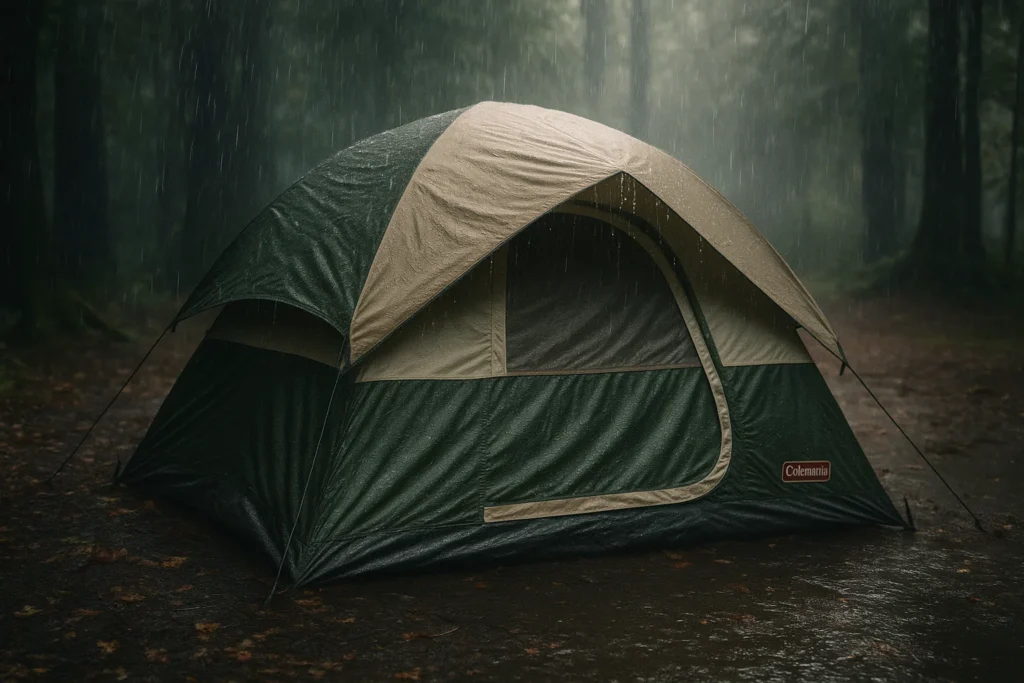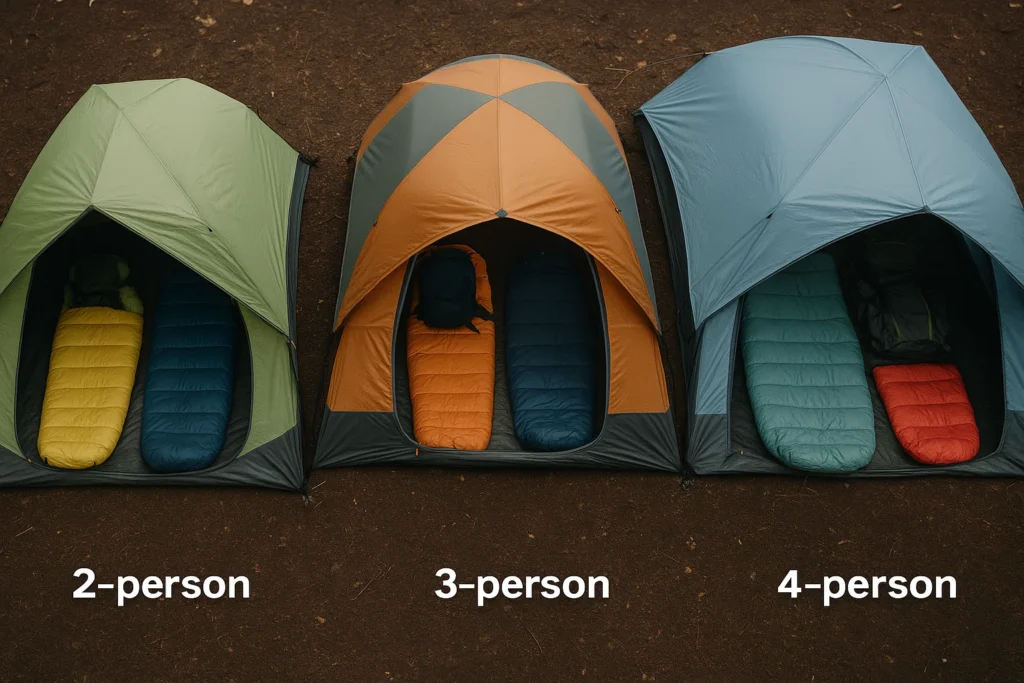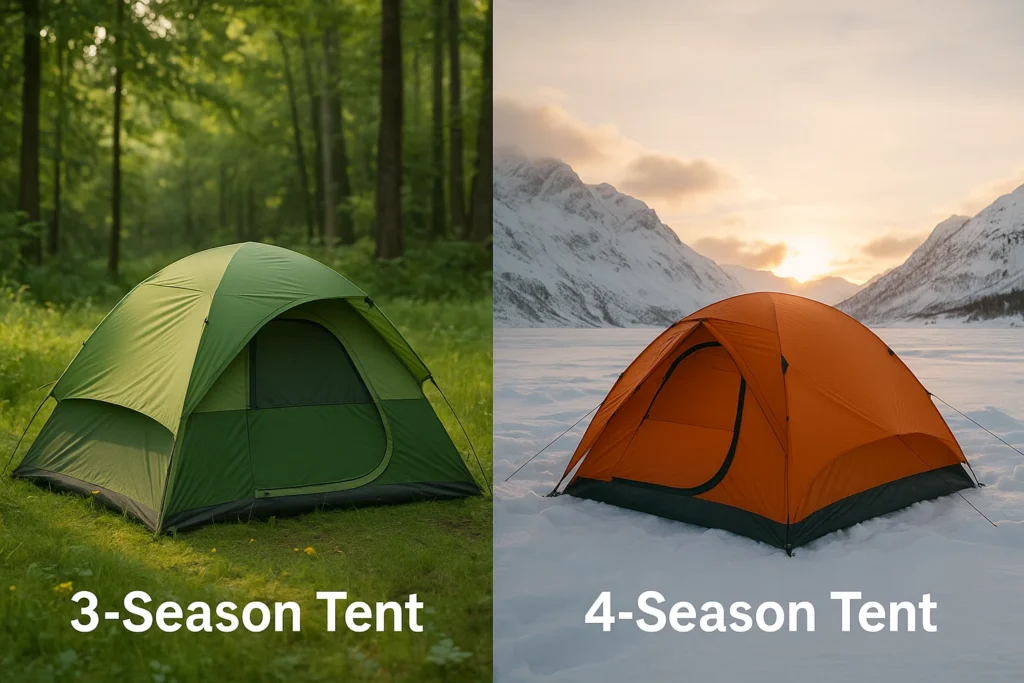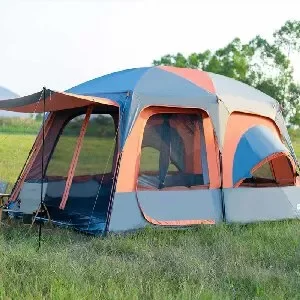When I bought my first tents for camping, it was a $40 Coleman Sundome from a clearance sale. I had no clue about tent seasons, pole materials, or vestibule space. A month later, I found myself in the middle of a thunderstorm in Utah — and to my surprise, I stayed bone dry all night. That moment taught me two things: not every budget tent is bad, and buying the right tent is more about matching it to your needs than simply paying more.

Start with Your Camping Style
Before diving into specs, ask yourself: how do you plan to use your tent? Your answer shapes every other decision.
- Car Camping: Comfort over weight. Think high ceilings, big doors, and space for an air mattress.
- Backpacking: Weight and pack size are king. Every ounce matters when it’s on your back.
- Mixed Use: Choose a versatile 3-season tent around 4-6 lbs that balances comfort and portability.
Tent Size & Comfort
Manufacturers love to overestimate tent capacity. A “2-person” tent often means two sleeping pads side-by-side with zero gear space. If you value comfort, go one size up.

| Use Case | Recommended Size | Notes |
|---|---|---|
| Solo Backpacker | 2P tent | Extra room for gear inside |
| Couple Car Camping | 3P tent | Space for air mattress & bags |
| Family of 4 | 6P tent | Multiple rooms for privacy |
| Large Group | 8-10P tent | Best for extended stays |
Seasonality Matters
- 3-Season: Best for spring to fall. Lightweight, breathable, handles moderate rain and wind.
- 4-Season: Built for snow and harsh winds. Less mesh, heavier fabric, warmer interior.
Unless you plan on winter camping above the treeline, a quality 3-season tent is the most versatile choice.

Weight & Portability
Backpacking? Look for 2-4 lbs per person. Car camping? Weight doesn’t matter as much, but remember, larger tents can be bulkier to set up.
Ultralight options like the Single person tent can be set up with just the rainfly and footprint for a minimalist camping shelter.
Key Features You’ll Thank Yourself For
- Vestibules: Covered gear storage is essential in wet weather.
- Double Doors: Makes midnight exits less awkward.
- Ventilation: Mesh panels prevent condensation build-up.
- Freestanding Design: Easier to pitch on hard ground.
- Footprint: Extends the life of your tent floor.
Budget & Price Ranges
- $50-$100: Entry-level options like Coleman Sundome — heavier but durable.
- $150-$300: Mid-range from REI or ALPS Mountaineering — lighter, better weather resistance.
- $400+: High-end like MOQI Expedition Series, Big Agnes, or Hilleberg — for serious expeditions.
Real Stories from the Trail
On a windy night in Patagonia, my friend’s bargain tent folded like a taco while my mid-range REI Half Dome stayed rock-solid. Another time in the Rockies, a hiker’s ultralight tent was so small he had to keep his backpack outside — it got soaked. Moral of the story: specs matter, but so does matching them to your real needs.
Special Considerations
- Camping with Pets: Choose a tent with durable flooring and extra vestibule space.
- Camping with Kids: Multi-room designs help keep bedtime sane.
- Extreme Weather: Look for geodesic dome shapes and strong aluminum poles.
Final Checklist Before You Buy
- Pitch your tent at home before your first trip.
- Check packed size and weight against your transport method.
- Always bring spare stakes and repair tape.
- Read reviews that mention real weather performance, not just specs.
Q&A Section
What’s the best all-around tent for beginners?
A durable, mid-weight 3-person, 3-season tent like the REI Half Dome or MOQI Explorer 3 balances comfort, durability, and price.
Is a footprint really necessary?
Yes. It protects the floor, adds water resistance, and can even be used with just the rainfly for a fast-pitch shelter.
How do I avoid condensation inside?
Choose a tent with mesh panels, keep vents open, and avoid cooking inside.
For more camping questions, visit our FAQ page.


